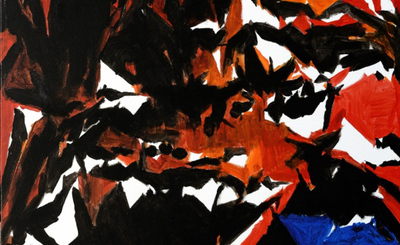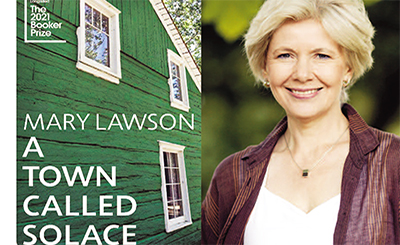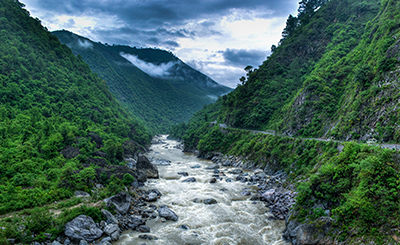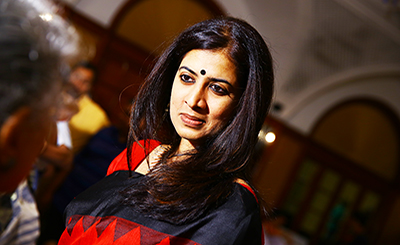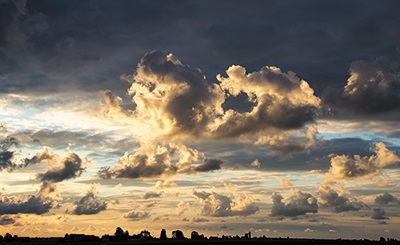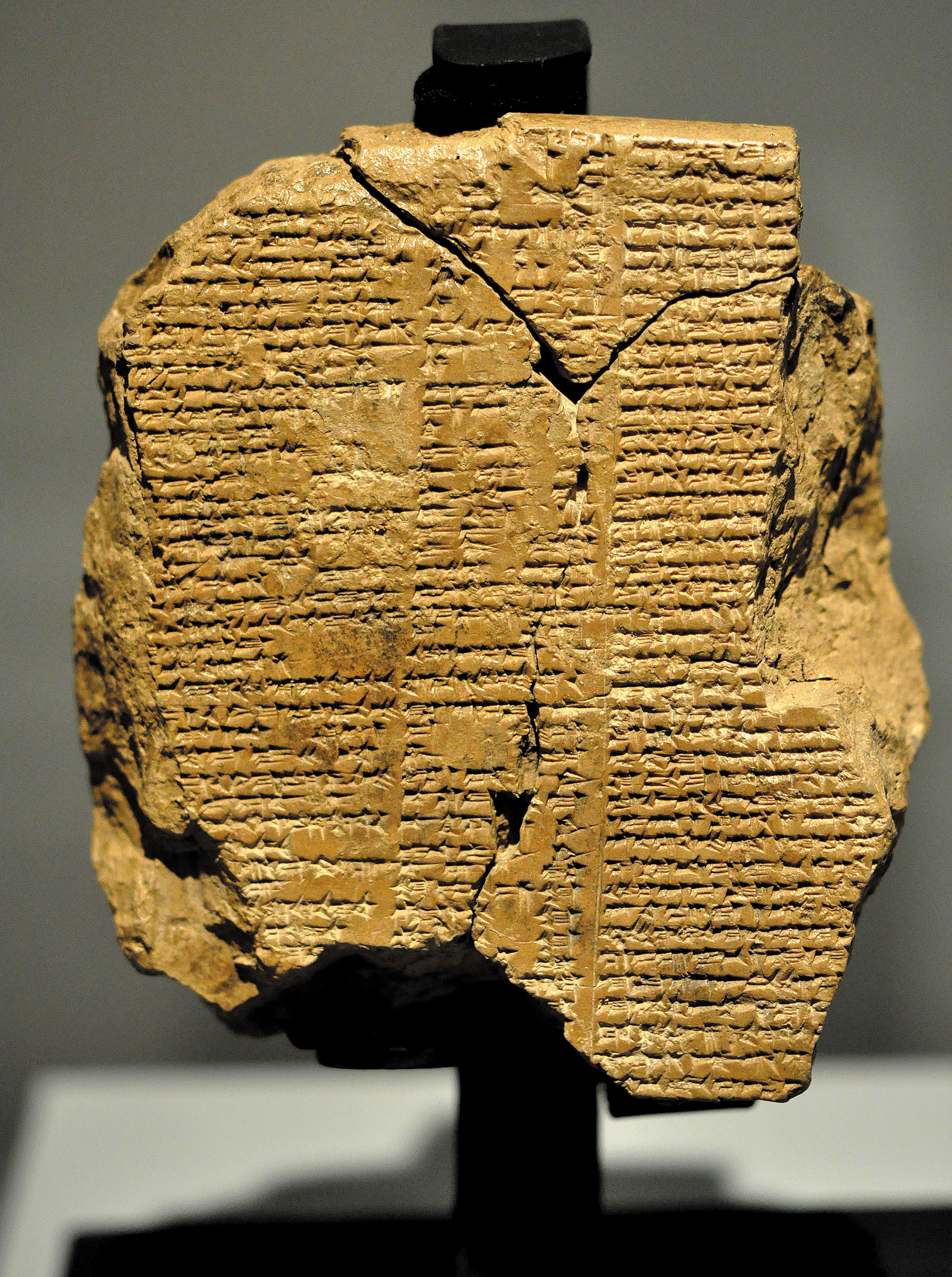
Tablet V of the Epic of Gilgamesh. The Sulaymaniyah Museum, Iraq. Photo: Wikipedia Commons
Extracts from Gilgamesh Retold
The earliest written stories from which the Mesopotamian Epic of Gilgamesh spring date from the Third Dynasty of Ur (circa 2100 BC). They inspired the later, eleven tablet version, collated by the priest/scribe/poet Sin-lique-Uninni in around 1200 BC. Written in cuneiform on hundreds of clay tablets found by Victorian archaeologists in the buried library of King Ashurbanipal (circa 650 BC) it is often regarded as the first great work of world literature. About a king who oppresses his people until the gods send him a friend, the wild man Enkidu, to teach him about love, humility and the responsibilities of kings, the story is as relevant today as when it was first written. These extracts are from a complete new, fifteen-chapter version, by Jenny Lewis, some of which has been translated into Arabic by Adnan al-Sayegh and Ruba Abughaida, performed at the British Museum, the Ashmolaen Museum, Oxford and several international festivals. ‘The Flood’ episode was exhibited as part of a collaboration with the British artist and printmaker, Frances Kiernan, at Salam House, London and at the Iraqi Embassy in April 2017, with an accompanying chapbook published by Mulfran Press.
Chapter 12
Gilgamesh at the Edge of the World
Consumed by grief after Enkidu’s death, Gilgamesh wanders in the wilderness until he
reaches the Edge of the World where he comes to a tavern kept by the demi-goddess, Siduri
Shrouded in hoods and veils she lived alone
At the sea’s edge beside the salty spray
And she was tough as wind-blown marram grass
Whose roots creep craftily beneath the dunes
And bind themselves to knot the flying sand.
Her dishes, racks and cups were solid gold
Her wine and beer was casked and kept in gold
Her tavern only visited by gods.
She saw him coming from a long way off,
At first a speck, a spot, a moving dot
But closer up she saw he was a man
So trouble-scarred, a leather sheath of bones
His face a pitted shield of dents and hacks
That life had dealt him, or the stony world.
As he drew near she ran to bolt her gate
With shackled breath, her chest a tightened strap
Of terror as she climbed up on her roof.
‘You! Woman! Open up!’ his shout was rough
She gave back words to him in eme-sal
‘First tell me who you are and why you’re here
And why you batter rudely at my door?’
With this soft speech she tamed his seething wrath
He dragged his fingers through his matted hair
And writhing in his woe he told his tale.
When she had heard it, she held out her hand
And led him to her table straight away
And sat him down and gave him beer and bread
And spoke to him as she would any king.
‘The path you’ve come is far yet it must stop
As every other’s must, except the gods’,
Deep in the earth’s loamed bed where you will sleep
And tread the dream-road to its bitter end.’
At this the listener’s tears began to stream
Like hares across a field in wintry sun.
Siduri spoke once more and took his hand —
‘Your wife and children wait for you at home
Be wise! Go back again to Uruk’s fold —
Among your kindred you’ll find warmth of heart
Is worth more than a thousand precious rings
And love, not battle glory, life’s great gift.’
Chapter 13
Meeting Uta-Napishtim The Flood Survivor
At last Gilgamesh finds Uta-napishtim who survived the Flood hundreds of years earlier.
Gilgamesh begs him for the secret of immortality but Uta-napishtim points out the
Gilgamesh begs him for the secret of immortality but Uta-napishtim points out the
disadvantages of living forever.
He said ‘When Enlil sent the mighty Flood
Ea came to me one night to warn me first
to make a vessel huge, of cedar wood
then gather seed of all that came from earth
each plant and bush, each tree, each bird that flies
each creature that is able to give birth
and bring them to the ark for sanctuary.
I toiled to finish well before the storm,
so when the tempest howled across the sky
and people cried as they began to drown,
the river rose to swallow all in sight
except my craft which floated, light as down.
Even the gods and goddesses took fright
and lay curled on the ground in sheeting rain
as dogs forsaken by their owners might
who wait to hear their name, yet wait in vain.
The sea became a city of the dead
and fishes made the forests their terrain
each cedar branch with moonstone scales inlaid
each date palm grove a giant bed for whales
each mountain peak a rock beneath the waves.
Six days and nights the violent typhoon raged,
then on the seventh, all was motionless,
the warrior winds of Shamash had been caged.
As Aya’s peaceful light flooded the skies
we held the deck rail, breathless, as we gazed
in silence on a mirrored paradise.
Near to Mount Nimrush now we castaways
waited for sinking waters to reveal
the slopes of mountains or some solid place
where we could disembark our crew of souls.
A dove flew out but then returned again,
a swallow also flew back to the fold:
but when I set the raven free it went
bobbing and bowing on its patch of land,
finding once more its source of nourishment.
As the waters drained away we found
no humans left on earth except for us;
we had escaped the fate Enlil had planned.
So Aruru gave us this new status —
alone of humankind to be immortal —
and how we long for this to be reversed:
to be allowed to pass through that same portal
that you so dread, my friend, that you so dread;
who wants eternal life when flesh is frail?
Silver Oak
instead of heat and light
grey shrouds
each morning a burial
we fight our way out of:
your sentinel stillness
seen through muslin
would look at home
in snow-covered tundra,
among the herds
and ice-lapped edges:
yet this is India too,
her private winter face
cleansed and secretive
in her dressing table mirror
with thoughts of spring
a world turned away from —
waiting for reflections
on a silver bark.
Maker
for Pedro Bosch
this is the place where broken
things come to rest from their brokenness
they can’t get the taste of terracotta
out of their mouths
they know they came from mud —
only yesterday
they were a substance
to be walked on
now their bridles, wings, trunks
hold unexplained shadows
the moon
eyes the world from their jagged holes
above them, peacocks roost in the trees —
Neem, Arjuna and the Banyan
under which Krishna sat
scooping butter
the bark’s twisted textures
are ropes going into the earth
resting before the spring burst
of growth, green after green
reaching for the sky with its
shattering light.
Tribute
They made shields from themselves, a phalanx of bony mantles
we crushed as we stepped ashore: clams, cockles, whelks — oysters
that changed from male to female over a hundred tides.
Then those women with their blue-veined forearms flung back
against the pebbles, not understanding us — their men off fighting
somewhere behind the hills, lost in perpetual drizzle and cloud.
All we wanted was comfort, but they showed us no compliance,
instead, they shut their ears to the foreign sounds we made,
white ears more delicate than shells, with tiny, labyrinthine cochleas.
They were less impressive than African bounty — the conch
and cowrie we used as currency, displays of wealth to string
round the necks of our black-haired Pompeiian women.
We took them anyway, translucent as the sunlight our ships turned
to plough through: scant booty, but it was enough for Caligula.
What We Thought We Knew
Once we might have believed, like Pliny the Elder did, that honey comes out of the air and is
chiefly formed at the rising of the stars. There is no honey, said Aristotle, before the rising of
the Pleiades just before dawn. Once just before dawn we had that sense of honeyrising; stars
flowed wordless through our bloodstreams, we imagined we would take our place among the
Pleiades — two figures chalked against the sky, the great lovers, star crossed; but space
between us condensed then flew apart until we could no longer touch skin through heaven’s
architraves while species died in their thousands and what we thought we knew also faced
extinction. Once someone somewhere built an ark but forgot to tell the animals so the last
Bouvier’s red colobus, the lastPuerto Rican tree frog, the last gold Martinique Parrot (which
all ought to have been saved) instead became faint watermarks orbiting the dark with soot-
ringed eyes watching dancing bees become a thing of the past.
chiefly formed at the rising of the stars. There is no honey, said Aristotle, before the rising of
the Pleiades just before dawn. Once just before dawn we had that sense of honeyrising; stars
flowed wordless through our bloodstreams, we imagined we would take our place among the
Pleiades — two figures chalked against the sky, the great lovers, star crossed; but space
between us condensed then flew apart until we could no longer touch skin through heaven’s
architraves while species died in their thousands and what we thought we knew also faced
extinction. Once someone somewhere built an ark but forgot to tell the animals so the last
Bouvier’s red colobus, the lastPuerto Rican tree frog, the last gold Martinique Parrot (which
all ought to have been saved) instead became faint watermarks orbiting the dark with soot-
ringed eyes watching dancing bees become a thing of the past.
More from The Byword
Comments
*Comments will be moderated




